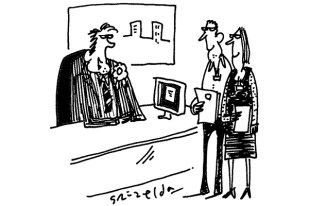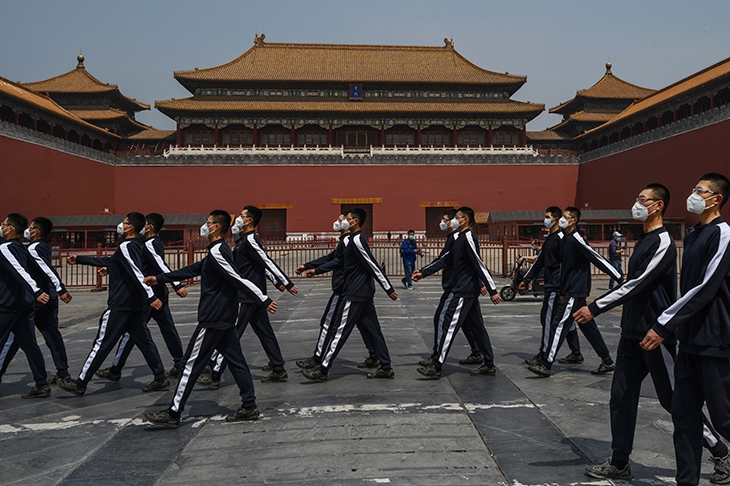Displaying the pristine neutrality that has made her such a popular figure, Newsnight’s Emily Maitlis apparently tweeted the following last week: ‘No. 10 is trying to control the media, and everyone in our democracy should be afraid.’ Sadly, this typically sane and measured observation was later deleted. Was she told to delete it? Or did she think better of it but was not quite up to tweeting: ‘No. 10 isn’t trying to control the media and we should probably all rest easy.’ I wonder how many other tweets she’s deleted before I got around to seeing them? ‘The schools are closed not on account of Covid but because giant Tory goblins are devouring our children. And nobody says anything.’ In Emily’s milieu — the Newsnight office, the BBC in general, her Twitterati acolytes and scullions — the question of bias does not occur because they mistake what they believe for the facts and have no mechanism for separating these two very different things.
Perhaps Emily should travel to China to understand a little better about state control of the media and threats to democracy. Not before time, China has soared up the list of countries we hate and is comfortably ensconced in the coveted number-one spot, exactly where it should be. A few years ago it was Russia: Novichok, Litvinenko, meddling in the affairs of other countries and annexing the Crimean peninsula. But we abide by the quantity theory of international hatred and can only properly loathe one country at a time. Our government has annoyed the Chinese (and its thuggish ambassador to the UK, Liu Xiaoming) by affording Hong Kong citizens with dual nationality the right to live in the UK. According to the Chinese, this is in contravention of the 1997 treaty we signed upon giving Hong Kong back to its motherland.

Our government is also executing a swift volte-face regarding Huawei’s involvement in the roll-out of our 5G network. Sooner or later I suspect there will be another about-turn, this time on Chinese financing of the Hinkley C nuclear power station. Mr Liu has said that we will face ‘consequences’ for our impudence, but has not spelled out what those might be. Our exports to China amount to exactly half of our imports from the benighted middle kingdom tyranny. Perhaps they will stop bunging us pandas every few years.
Our animosity towards China — very welcome, in my book — has grown exponentially since we took possession recently of the country’s most vibrant export, the Covid-19 virus. Even in January our government was assuring everybody that the Huawei deal would go ahead, given that the firm’s limited involvement in our 5G network precluded any possible risk to our security. There was back-bench dissatisfaction, of course, but no real indication that the government would resile from its position. What, exactly, has changed since then, except for Covid? It is true that the bullying of Hong Kong has been stepped up — but it was still very much present at the end of last year, if you remember.
We abide by the quantity theory of international hatred and can only loathe one country at a time
It is true too that China has upped its sabre-rattling against India over the disputed Ladakh Himalayan border between the two countries and is now threatening tiny Bhutan — but we never really gave much of a monkey’s about that. Otherwise, things remain the same. China carries out cyber attacks on countries it doesn’t much care for, such as Australia, it is still illegally in possession of Tibet, continues to harass its neighbours in south-east Asia over the Spratly and Paracel Islands, routinely threatens free Taiwan and, most egregiously of all, commits genocide against the Uighur Muslim Chinese in the west of the country, now reportedly sterilising female Uighurs against their will. Well, I say most egregiously, but there is also China’s refusal to allow its people freedom of speech and democracy and subject them instead to arbitrary arrests and detentions.
Perhaps we have come to realise that the thing we used to talk about with something approaching admiration, Asian-style democracy, is simply what we used to call despotism under a kinder name. There is not much of a difference in principle between the suppression of freedom and democracy in China, Vietnam, Laos and North Korea, which consider themselves communist countries, and those which — like the Philippines or Turkey or Russia — are run by autocrats who are not communist. Some are worse than others, of course, but in essence they are the same in their utter disdain for their subjects. There has always been a certain conscious or unconscious racism at work in our thinking, the consequence of our refusal to judge. Asian countries suit these forms of government because they care less about stuff like human rights, we tell ourselves. Do they? Is that true of the Hong Kong protestors or the Uighur Muslims? Is it true of the Christians and homosexuals living in Saudi Arabia, or the ethnic minorities in Turkmenistan and Uzbekistan?
Nick Cohen addressed this issue in the Observer last Sunday, musing why it was that majority Muslim countries had remained silent over China’s appalling treatment of the Uighurs. His conclusion — the right one, I think — was that their governments are similarly despotic, even if the brand of despotism is different. Cohen added: ‘It may be a cheap point, but it remains true that if a western country were to display one-tenth, one-hundredth or one-thousandth of the brutality that China is inflicting on Muslims, the global left would be burning with outrage.’ They’re too busy howling about Israel, Nick.
It is a racist conceit to suggest the people love this style of government. Rather as if one were to say that African people enjoy being ruled by greedy, semi-literate fascists — it’s the best those poor blighters can expect.
The final lie is that these governments, unpalatable though they may be to us soft westerners, are at least efficient. Things get done there, quickly. But Covid should remind us that the sclerotic power structures, the fear and the paranoia which always accompany such regimes militates against efficiency. Despotic, then, and inept.
Spectator.co.uk/Rodliddle
The argument continues online.







Comments